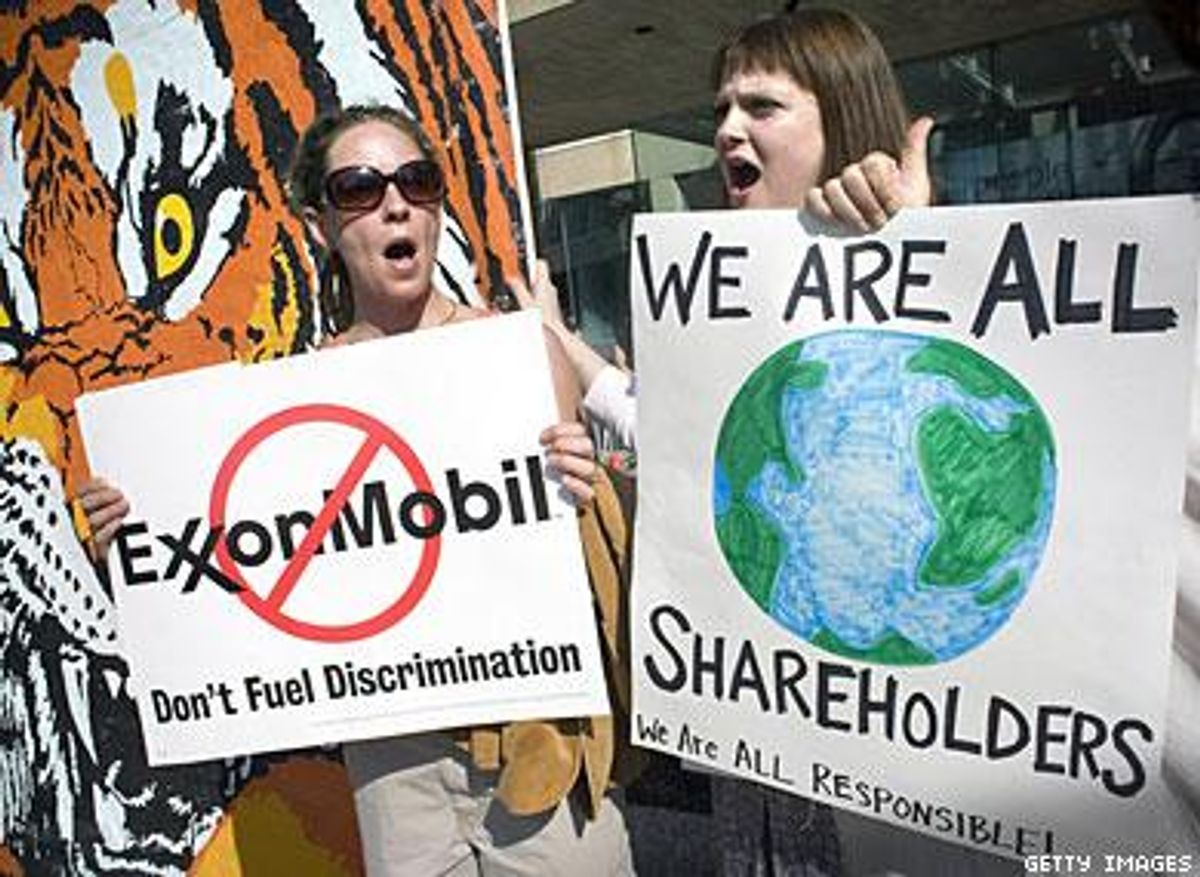The Securities and Exchange Commission rejected a request by ExxonMobil to block a nondiscrimination shareholder resolution proposing protection for employees against discrimination based on sexual orientation and gender identity, paving the way for a vote on the measure at a shareholder meeting this May.
The regulatory agency issued its ruling Tuesday, according to the office of New York State comptroller Thomas P. DiNapoli, which filed the resolution. The resolution requests that ExxonMobil "amend its written equal employment opportunity policy to explicitly prohibit discrimination based on sexual orientation and gender identity and to substantially implement the policy." Noting the inconsistencies between state and local laws concerning employment discrimination, the resolution acknowledges that the company would benefit from a "consistent, corporate wide policy to enhance efforts to prevent discrimination, resolve complaints internally, and ensure a respectful and supportive atmosphere for all employees."
In January, ExxonMobil wrote to the SEC to argue that the company's employment policies already conformed to the proposal's request. "Specifically, the Employment Policies and Practices page on ExxonMobil's internet site now specifically states that our zero-tolerance policy against any form of employment discrimination covers both sexual orientation and gender identity," said the letter. The policy in question says, "Any form of discrimination by or toward employees, contractors, suppliers, and customers in any ExxonMobil workplace is strictly prohibited. Our global, zero-tolerance policy applies to all forms of discrimination, including discrimination based on sexual orientation and gender identity."
The office of chief counsel in the SEC's division of corporation finance rejected that assessment in its response sent this week. "Based on the information you have presented, it appears that ExxonMobil's policies, practices and procedures do not compare favorably with the guidelines of the proposal and that ExxonMobil has not, therefore, substantially, implemented the proposal," said the letter.
This year marked the first time that ExxonMobil had challenged the shareholder resolution, while the comptroller has filed similar resolutions with the Irving, Texas-based company since 2008. Last year, the proposal garnered significant support in the shareholders' vote, representing over 500 million shares with a market value of more than $42.4 billion, according to the comptroller's office. A spokesman for the comptroller said officials were "optimistic" that the vote total will be even higher this year when the annual shareholder meeting takes place on May 30.
ExxonMobil has consistently ranked at the bottom of the Corporate Equality Index from the Human Rights Campaign, which measures corporations according to criteria including equal employment opportunity policies, partner benefits, and transgender-inclusive health coverage. The company was the first to ever receive a negative rating, earning a score of -25 in the 2012 index. Prior to the merger of Exxon and Mobil in 1999, Mobil offered domestic-partner benefits and an employment nondiscrimination policy that included sexual orientation.
Compared to the legal field, where 55 companies receiving a perfect index score of 100, the oil and gas industry lags. Only one company in the category, Chevron, based in San Ramon, Calif., received a perfect score. The index found that 86% of all Fortune 500 companies have explicit policies banning discrimination based on sexual orientation and 50% also prohibit discrimination based on gender identity.
"ExxonMobil is putting investors at risk by failing to prohibit discrimination based on sexual orientation and gender identity," said Comptroller DiNapoli in a statement. "ExxonMobil claims it does not have discriminatory policies but it continues to deny health benefits to same-sex couples who are married in New York State that are automatically given to married couples. I urge shareholders to support my proposal to ask ExxonMobil to end these practices and bring this company into the modern age."
The comptroller is responsible for making investment decisions for the $140 billion New York State Common Retirement Fund, which holds the pension assets of more than 1 million active and retired government employees. As one of the world's largest institutional investors, DiNapoli and previous state comptrollers have pressured companies to confront policies ranging from unfair domestic employment practices to apartheid in South Africa.
This year, the comptroller has filed resolutions calling for votes on new nondiscrimination policies at 12 Fortune 500 and Fortune 1000 companies. Agreements have been reached with eight companies, including Equifax, resulting in the withdrawal of the proposals. In addition to ExxonMobil, Amerco, American Financial Group, and HSN are expected to vote on the resolutions.












































































